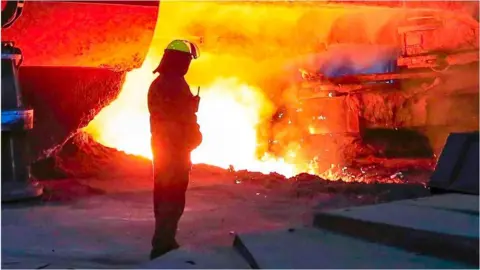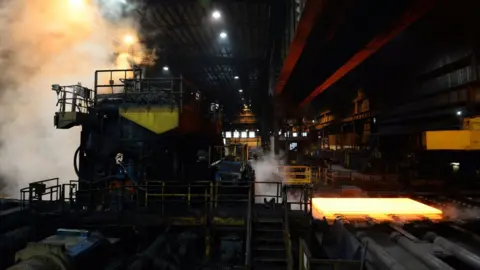What are the EU rules about state aid?
 AFP
AFPThe government has decided not to provide extra money to British Steel, which is to enter insolvency.
Labour leader Jeremy Corbyn had called on Theresa May to take a public stake in the company, having previously said that Brexit could be an opportunity to pump more cash into British industry.
He said that European Union (EU) rules restricted so-called "state aid", so Brexit could make it easier for the British government to support the British steel industry.
But other EU member states, such as France and Germany, spend far more than the UK on state aid despite also signing up to the same single market rules, so are they really an obstacle?
And leaving the EU may not mean an end to these rules.
Other state-aid restrictions would be likely to apply to post-Brexit Britain, such as World Trade Organization rules and the terms of any future trade deal with the EU.
What is state aid?
State aid is financial assistance given by the government to companies or other organisations that has the potential to distort market competition.
The aid can be in the form of direct cash grants or indirect aid - such as preferential borrowing rates or tax credits.
Under EU rules, member-state governments are allowed to provide state aid only with approval from the European Commission.
For example, in 2015 the UK government submitted plans to provide a subsidy to Drax power station to convert one of its units from coal to biomass fuel.
Following an investigation, the commission ruled in favour of the scheme.
There are exceptions to the rules. For example, governments can provide aid for broadband infrastructure without prior approval. And aid worth less than 200,000 euros (£175,000) over three years is exempt.
 PA
PA
Do the rules prevent support for the steel industry?
The EU Commission says too much steel is produced in Europe. As a result, it has been inclined to take a fairly tough line on state aid in this sector.
In 2016 for example, the commission ordered Belgium to recover 211m euros in illegal state aid it had given to its steel industry.
That does not mean all state aid is impossible, but the government would have to make a case that assistance was within the rules, or fell under one of the exemptions.
One possibility would be to argue that the steel industry was essential for national security, but it is far from clear the commission would accept that.

Would state aid be easier after Brexit?
If the UK left the EU single market, it would no longer formally be bound by the EU's state-aid rules.
However, the EU is concerned the UK could use Brexit as an opportunity to undermine the single market, by giving its companies an unfair advantage.
The political declaration on the future relationship between the UK and the EU says it must "ensure open and fair competition" and that should include provisions to cover state aid - but Theresa May has repeatedly failed to get this through Parliament.
In her Florence speech, in 2017, she said the UK and EU agree "trying to beat other countries' industries by unfairly subsidising one's own is a serious mistake".
Aside from what is agreed with the EU, after Brexit, Britain will still belong to the World Trade Organization, which also has state-aid rules: members can impose tariffs - taxes on imports - on countries that excessively subsidise domestic industry.

 PA
PACould the UK be doing more now?
The EU measures how much money countries spend on state aid, as a proportion of their economy.
The UK ranks very low down, spending just 0.38% of its gross domestic product - the total value of all good and services produced. This is far lower than Germany (1.31%), France (0.76%) and Poland (1.59%).
Therefore, it seems likely that EU single market rules are not the only thing limiting state aid.

What about nationalisation?
The Labour leader said the government should have decided it wanted to own British Steel and nationalised it - but that is also tricky under EU rules.
A government can own a company under state-aid rules - but it is not allowed to keep it going if it would otherwise fail.
So if a government could convince the European Commission that buying the business would be a sensible move that any investor would make for a profit, it would not be classified as state aid.
That might have been a difficult argument to make with British Steel.



